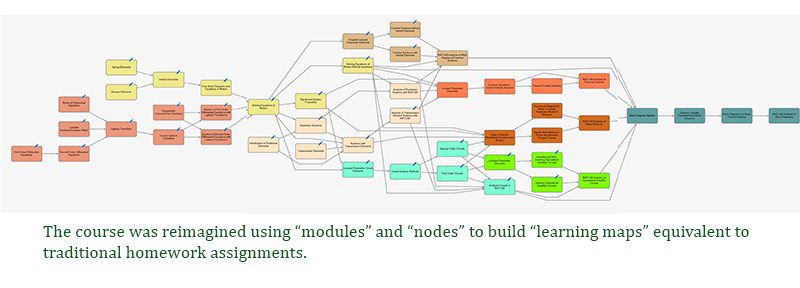Innovative UNC Charlotte Program Brings Adaptive Learning to Engineering Education
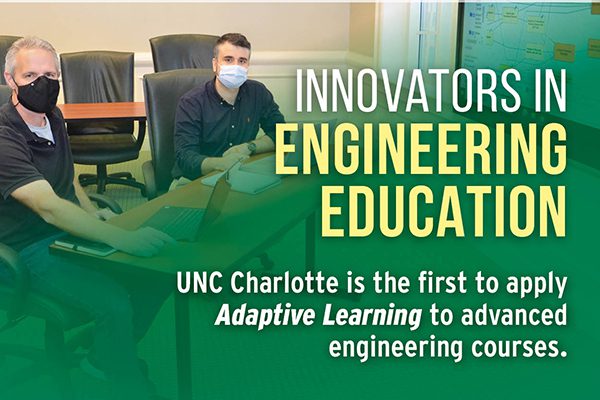
In a step of true engineering education innovation, UNC Charlotte has integrated game-changing Adaptive Learning methodology into an upper-level engineering course, resulting in dramatic improvements in student retention, and more importantly, learning comprehension.
Mechanical Engineering faculty members in UNC Charlotte’s W.S. Lee College of Engineering are the first in the United States to apply Adaptive Learning technology from educational technology company Realizeit into an advanced mechanical engineering curriculum, including a seamless integration with MATLAB. By creating Adaptive Learning modules for the course Dynamic Systems II (Engineering Dynamics), instructors have integrated artificial intelligence into the class, allowing students to get instruction tailored to their individual strengths and weaknesses.
With the system analyzing students’ performance, letting them move ahead in some topics and requiring them to do additional work in other areas, the traditional failure and withdrawal rates (DFW rates) for large course sections have improved by a factor of three, dropping from 6.61 percent to 1.97 percent. Since 2012, students have been asked the same exam question to gage understanding of fundamental mathematical tools, and the mean performance on this question has risen from 76 percent prior to Adaptive Learning, to 94 percent with Adaptive Learning.
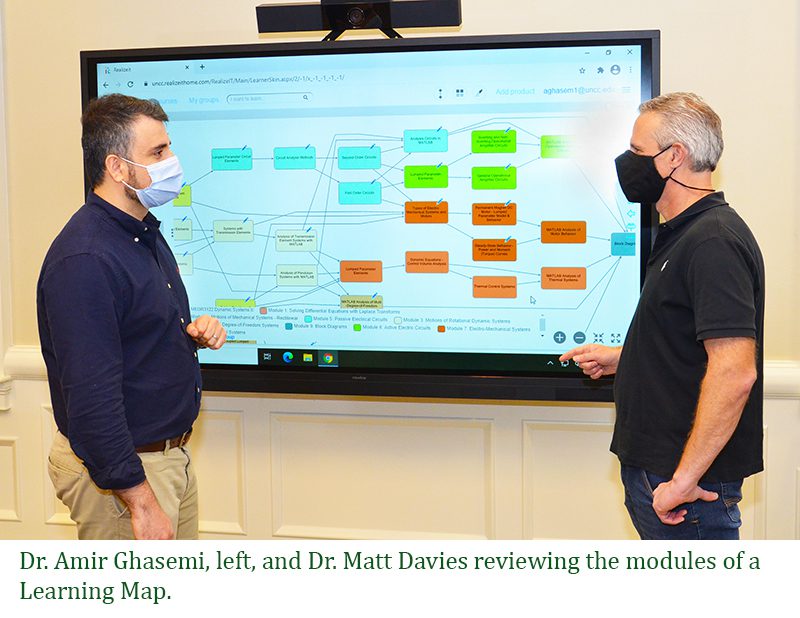
Dr. Matt Davies and Dr. Amir Ghasemi of the Mechanical Engineering and Engineering Science Department created the Adaptive Learning course, along with help from the UNC Charlotte Center for Teaching and Learning, Realizeit and a team of student contributors. Dynamics Systems II is a core junior level course that teaches fundamental dynamic modeling of engineering systems using differential equations. The course has seen rapid growth in the past two decades, going from 42 students per section in 2003 to 119 students in 2019.
The team chose Adaptive Learning for Dynamics Systems II, because success in the course requires repetitive practice, traditional teaching methods break down in the now larger classes, and it is suited to “variablization”. Their hypothesis was that a more solid mathematical foundation taught through Adaptive Learning would lead to greater success on the harder concepts, resulting in less frustration and failure for students.
The team began developing the Adaptive Learning modules in the summer of 2018, and the first implementation was in the spring of 2019 for a class of 119 students. “It was trial by fire,” Dr. Davies said, “but we saw good results from the very start. After the first exam, far fewer students than usual dropped the class.”
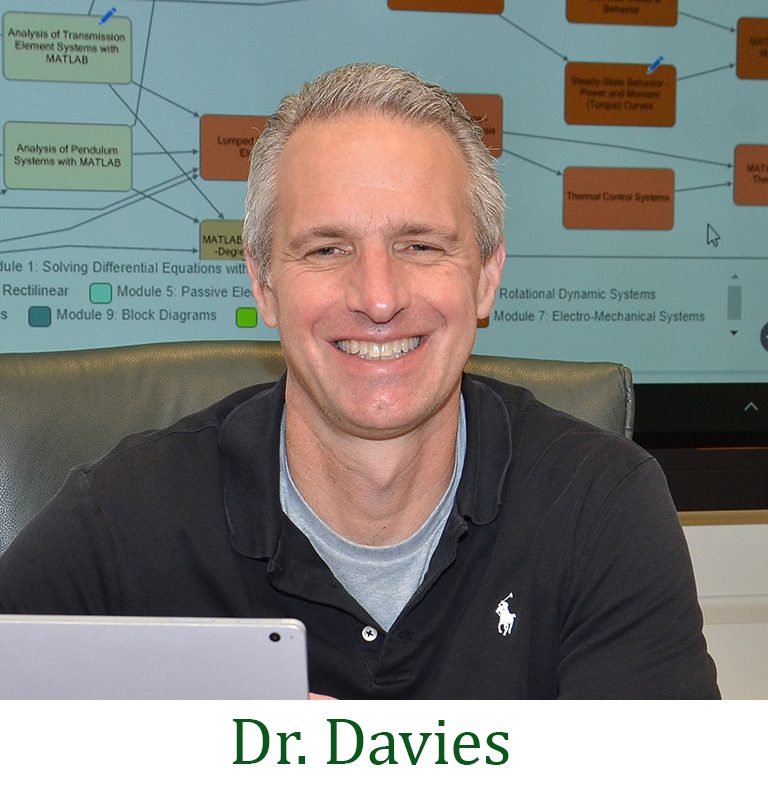
Adaptive Learning did a better job teaching the math, which is a key to success in the course, Dr. Davies said. “I could tell that through Realizeit more students had actually learned and understood the math, which is the foundation of the course. This semester (fall 2020), we didn’t lose a single student after the first exam. And the overall course keeps improving.”
The strength of Adaptive Learning is its use of machine learning and artificial intelligence. As a self-learning engine, Adaptive Learning continuously measures each student’s progress and then adapts to shape personalized learning experiences based on performance. As students work through the modules, instructors receive learning map updates showing overall class and individual progress and performance, allowing them to adjust and tailor their teaching to achieve measurable learning outcomes.
“It is a lot of work to build the Adaptive Learning structure,” Dr. Davies said. “We essentially had to reimagine the course using modules, nodes and learning maps. Each ‘learning map’ is roughly equivalent to a traditional homework assignment, and contains nodes that have learning content, practice questions and assessment questions.”

Bringing more Adaptive Learning to the delivery of engineering courses is a goal of the W.S. Lee College of Engineering, said Dean Rob Keynton. “As a personalized learning tool using artificial intelligence, Adaptive Learning is very promising and effective in teaching difficult subjects,” Dean Keynton said. “I’d like to see, where through Adaptive Learning, every student truly understands the material, leading to them successfully graduating as highly competent engineers and ultimately thriving as professional engineers.”
The College of Engineering is working to integrate Adaptive Learning into more courses across the curriculum. “There is so much opportunity for us in this area,” Dean Keynton said. “I can envision this as a major strength of our program in the future. It can have a tremendous impact on all students, especially students from targeted subpopulations, and change the paradigm of how students progress.”
Adaptive Learning brings interesting possibilities for instructors, because it creates innovative learning opportunities in two environments, said Dr. Ghasemi. “There is the traditional lecture side and the Adaptive Learning side. The Adaptive Learning side lets you introduce more details and examples than you normally could in regular lectures. This allows you more time in the lecture portion of the class to dig into the concepts and theory behind the material.”
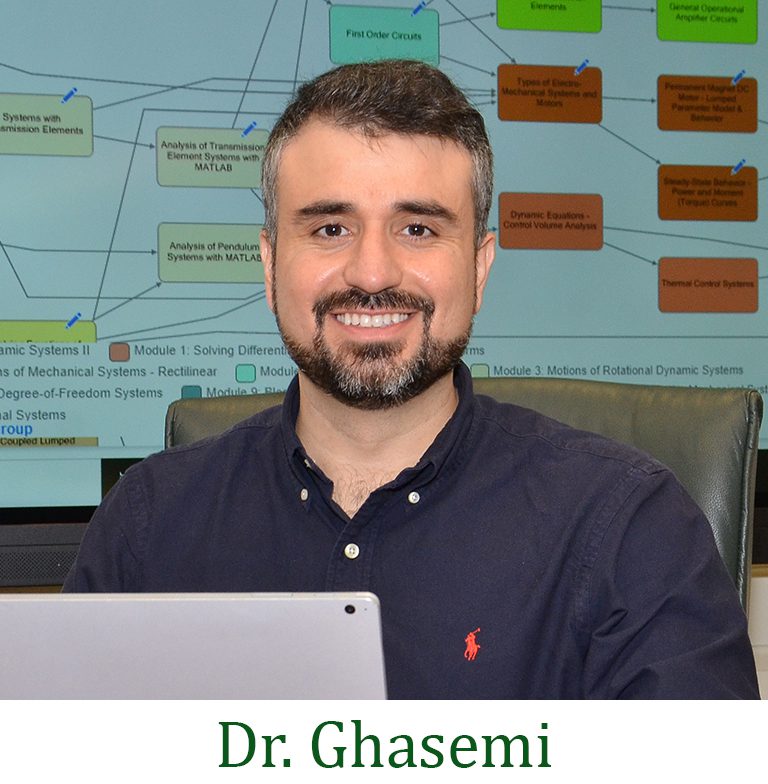
The content created for Adaptive Learning also has the potential of being used in multiple courses. “When I was creating one module during the summer, I realized I could keep adding content and resources to expand the material,” Dr. Ghasemi said. “I can easily see how modules and their material can be used from one course to another and not just isolated to a single class. I see a lot of long-term value throughout the curriculum.”
The initial vision for integrating Adaptive Learning into Dynamics Systems II was that it would be used in traditional classroom lecture settings. As with other institutions across the country, most UNC Charlotte instruction has been and continues to be delivered remotely in 2020 and 2021. In this environment, Adaptive Learning has proven itself to be an excellent flexible learning platform.
“During the pandemic, the system was invaluable,” Dr. Davies said. “The main reason for this, from my perspective, is that it opened a ‘virtual communication’ channel that was much more effective and active than Zoom lectures. I have much more interaction with the student through the Realizeit Adaptive Learning software than through Zoom. For fall 2020, when the class was taught entirely online, the DFW rate was only two percent, which was a real surprise for me.”
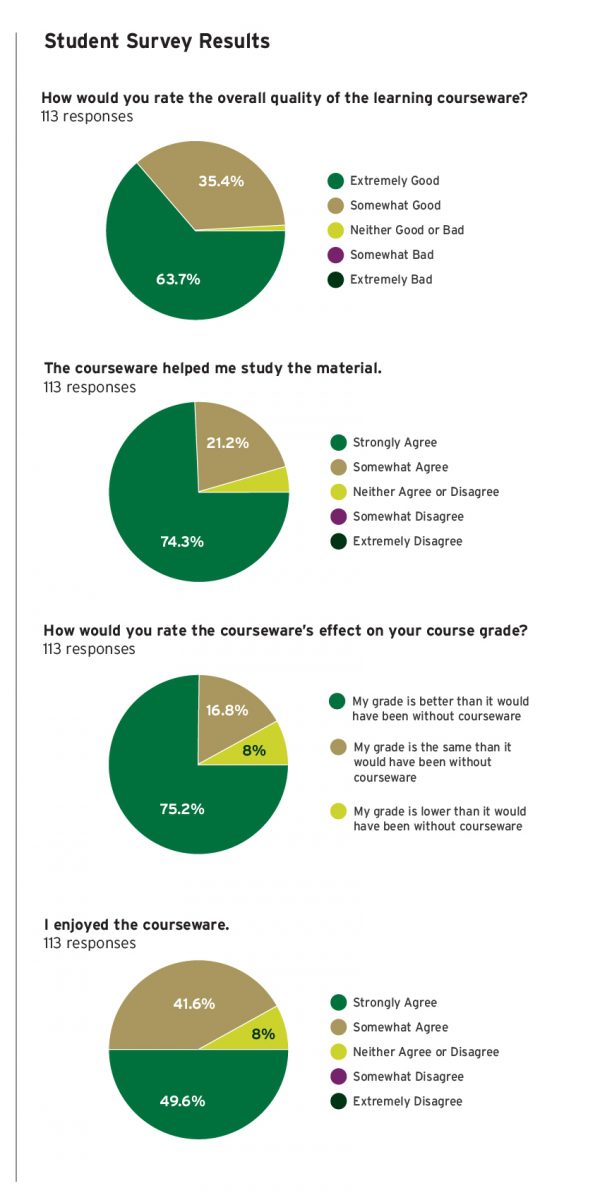
The team is continuing to assess Adaptive Learning and doing direct comparisons to traditional lecture styles. Students have provided extensive feedback, which shows they overwhelmingly prefer Adaptive Learning. Some student comments include:
- “I think the key that makes Realizeit so much better than normal homework is the instant feedback. Understanding what you have done wrong immediately after making a mistake is what allows studying and homework to be effective learning tools.”
- “Realizeit was great, due to the ease of practicing the material for the exam. You could go back through Realizeit and practice the problems as many times as you wanted. Also, there were clear steps on how to do the problems.”
- “I believe the structure of Realizeit got me to study more, or, at times, the program simply helped me to understand the material quicker and therefore actually spend less time with conceptual portions. This allowed me to move onto examples and problems.”
- “The Realizeit software was good for the practice, even though it took a lot of time to complete. It forced me to study more, which in turn allowed me to understand the content better than just relying on a book for studying.”
- “I definitely would like Realizeit throughout the whole course. The program was easy to use and understand.”
